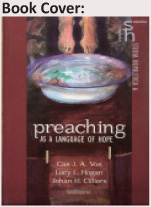Services on Demand
Article
Indicators
Related links
-
 Cited by Google
Cited by Google -
 Similars in Google
Similars in Google
Share
HTS Theological Studies
On-line version ISSN 2072-8050
Print version ISSN 0259-9422
Herv. teol. stud. vol.67 n.3 Pretoria Jan. 2011
BOOK REVIEW
Preaching with integrity, imagination and hope
Book Title: Preaching as a language of hope (Studia Homiletica 6)

Editors: Cas J.A. Vos, Lucy L. Hogan & Johan H. Cilliers
ISBN: 978-1-86919-194-8
Publisher: Protea Book House, Pretoria, 2006, Paperback, p. 236, ZAR120.00*
Reviewer: Hennie J.C. Pieterse (Emeritus Professor) Department of Practical Theology, University of Pretoria, South Africa Email: pietehjc@absa.co.za
A new discussion on the approach to this subject is taking place in South African homiletical circles. We are busy revisiting our theories developed after the turn to empirical studies in practical theology after the 1960s. Over the last 40 years, epistemological questions, hermeneutics as it pertains to homiletics, and communication theories are being developed.
One of the discussions in South African homiletical circles deals with the questions raised by postmodern challenges to homiletics. Can we speak of 'truth' - the truth of the message we hear and understand in our own context in the Biblical text; can our language transcend the view of a closed reality when we name God in our sermons; are we compelled to preach only in narrative modes in our contemporary context?
This book contains the papers by scholars from all over the world, read during the 7th Congress of the Societas Homiletica, held at the University of Pretoria, (05-10 August 2006). The scholars confront us with a refreshing diversity of approaches and aspects of contemporary homiletical research. In one way or the other they work with a post-fundamentalist approach to epistemology in the rationality sphere of Wentzel van Huyssteen's thinking and speak with integrity on sensible communication of the gospel in preaching in our day (see pp. 76; 23). We can speak of God in preaching with integrity.
The papers all follow a contextual approach. The eight contributions forming Part III, deal with the issue of preaching hope in different contexts and are: 'An example of empirical homiletics in a suffering world' (Immink and Verweij); 'HIV and AIDS' (Cilliers); 'Hunger and affluence' (De Klerk); 'Pastoral care' (Anderson); 'Hunger and affluence in India' (Gnanavaram); 'Love as a support base for the alleviation of poverty' (Letsosa); 'Hope in the field of psychotherapy' (E. Grözinger); and 'Those who had an influence on a Black person in South Africa' (Masango).
Fundamental theological arguments play a role in putting theoretical insights on the table for contemporary preaching in different contexts (pp. 29-58) Homiletics cannot exist without theological thinking, and this applies to all ages. Therefore, a rhetorical form is still very important in our day. It is not only stories that communicate the gospel today, but also arguments (Part 1 of the book). It is, however, necessary that preachers should preach with imagination: seeing visions and dreaming dreams (pp. 60-69).
It is not a surprise, therefore, that in nearly every contribution in this book (for instance pp. 22-24; 79-81) strong emphasis is put on metaphors in sermons. Preaching is a language event. The different uses of language are studied throughout the history of homiletics. In this book not only rhetorical language and the narrative is presented, but also the poetic. Therefore, three sermon forms function effectively in our contemporary situation. This view is strongly supported by the new Lehrbuch Praktische Theologie Band 2 on homiletics by Albrecht Grözinger, Professor at the University of Basel (A. Grözinger, 2008, Homiletik, Gtersloher Verlagshaus, Gütersloh, pp. 177-241). On the topic of narrative preaching, Albrecht Grözinger has contributed a fascinating piece of writing on the parables of the Kingdom in the book under review (Preaching as a language of hope, pp. 91-100).
The theme of hope is reflected in all the papers. Preachers who feel despondent about preaching in the Zeitgeist of our day and have doubts about the role of preaching, will be inspired to again discover that our speech in preaching can indeed communicate hope.
* Book price at time of Review














